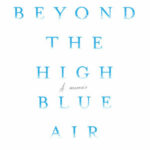Lu Spinney
Lu Spinney was born in Cape Town and spent her childhood on a farm in the Midlands of KwaZulu–Natal, later moving with her family to the Indian Ocean coast north of Durban. After university, she left South Africa to live in Nice and Paris, before settling in London.
Subscribe to our newsletter for news & events from Catapult.
Books
Beyond the High Blue Air
A Memoir
“Like The Year of Magical Thinking by Joan Didion, Beyond the High Blue Air is a spare, sharp memoir about the speed with which a comfortable existence can be blighted by grief.” —Bee Wilson, The Sunday TimesLu Spinney’s memoir Beyond the High Blue Air is at once a portrait of the fearlessness of familial love and the profound dilemma posed by modern medicine. When Spinney’s twenty–nine–year–old son, Miles, flies up on his snowboard, “he knows he is not in control as he is taken by force up the ramp,” writes his mother, “skewing sideways as his board clips the edge and then he is hurtling, spinning up, up into the free blue sky ahead . . .” He lands hard on the ice and falls into a coma.
Thus begins the erratic loss—Miles first in a coma and then trapped in a fluctuating state of minimal consciousness—that unravels over the next five years. Spinney, her husband, and three other children put their lives on hold to tend to Miles at various hospitals and finally in a care home. They hold out hope that he will be returned to them. With blunt precision, Spinney chronicles her family’s intimate experience.
And yet, as personal a book as this is, it offers universal meaning, presenting an eloquent and piercing description of what it feels to witness an intimate become unfamiliar. This is a story about ambiguous loss: the disappearance of someone who is still there. Three quarters of the way through, however, Spinney’s story takes a turn. The family and, to the degree that he can communicate, Miles himself come to view ending his life as the only possible release from the prison of his body and mind. Spinney, cutting her last thread of hope, wishes for her son to die. And yet, even as she allows this difficult revelation to settle, she learns that this is not her decision to make. Because Miles is diagnosed as being in a “minimally conscious state” rather than a “persistent vegetative state,” there is no legal way to bring about his death, a bewildering paradox that Spinney navigates with compassion and wisdom. This profound book encompasses the lyrical revelations of a memoir like Jean–Dominique Bauby’s The Diving Bell and the Butterfly as well as the crucial medical and moral insights of a book such as Atul Gawande’s Being Mortal.
Catapult | Counterpoint | Soft Skull
20 Jay Street #704
Brooklyn, NY 11201
646.926.0805 | contact@catapult.co
20 Jay Street #704
Brooklyn, NY 11201
646.926.0805 | contact@catapult.co





